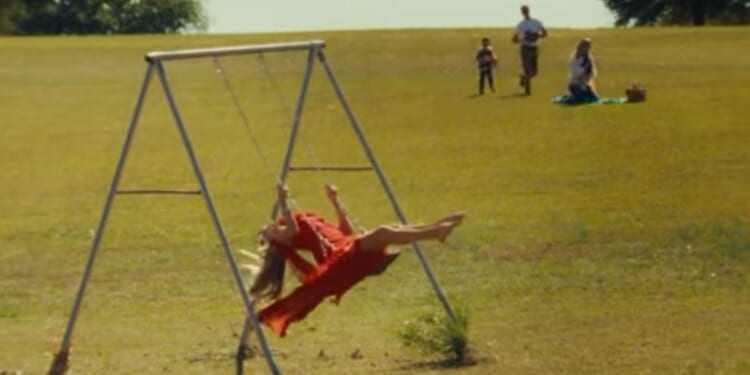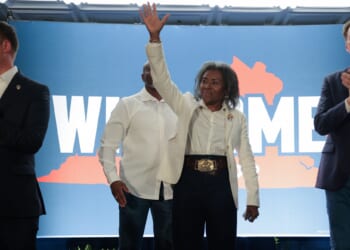Several generations of women might hear their own experiences echoed in a mournful new song about emptiness and lies.
On Friday, 32-year-old country music star Kelsea Ballerini, a six-time Grammy Award nominee, released the song “I Sit in Parks.”
If you can imagine the longing that a successful-yet-childless woman in her early thirties might feel as she sits alone in a park on a Saturday, then you already understand why “I Sit in Parks” might strike the mature listener as an indictment of the entire secular-liberal-feminist enterprise.
The song opens with a slow and simple country melody that leads into Ballerini’s beautiful vocals.
Melancholy and memorable lyrics, however, separate “I Sit in Parks” from most other songs.
The first verse goes as follows:
I sit in parks, it breaks my heart, ’cause I see
Just how far I am from the things that I want
Dad brought the picnic, Mom brought the sunscreen
Two kids are laughing and crying on red swings
We look about the same age
But we don’t have same Saturdays
In other words, Ballerini longs for motherhood and family.
Which group of woman do you think tends to be happier: feminists or traditionalists?
Then, the chorus encapsulates her feelings of regret:
Did I miss it? By now, is it
A lucid dream? Is it my fault
For chasing things a body clock
Doesn’t wait for? I did the d*** tour
It’s what I wanted, what I got
I spun around and then I stopped
And wonder if I missed the mark
Finally, the second verse in this two-and-a-half-minute gem of a song exposes the consequences of secular-liberal-feminist lies:
So, I sit in parks, sunglasses dark, and I
Hit the vape, hallucinate a nursery with Noah’s Ark
They lay on a blanket, and G**d*** it, he loves her
I wonder if she wants my freedom, like I wanna be a mother
But Rolling Stone says I’m on the right road
So I refill my Lexapro, thinking
WARNING: The following video contains song lyrics that take the Lord’s name in vain
In every meaningful respect — honesty, power, brevity — “I Sit in Parks” hit it out of the park.
Of course, a young woman’s perspective will necessarily escape many readers’ appreciation. Admittedly, a man in his fifties, even a childless one, can feel the full and crushing weight of Ballerini’s anguish-filled longing only by empathizing with her.
The song’s indictment of the secular-liberal-feminist agenda, however, is another matter.
Amid lyrics defined largely by sadness, two lines in particular should produce righteous outrage:
But Rolling Stone says I’m on the right road
So I refill my Lexapro, thinking
In other words, popular culture’s leftist gatekeepers have told millions of young women that happiness lies in self-absorption. Ballerini singled out leftist “Rolling Stone” magazine. But she could have chosen any number of liars who have spent decades undermining the family.
Now, because she believed the liars, she needs her depression and anxiety medication.
To paint as fair and complete a picture as possible, however, we also must avoid a scolding or Pollyannaish tone.
For instance, in 1991, country music legend Reba McEntire released a powerful song that sent a slightly different message. With the same authenticity as Ballerini’s new hit, McEntire’s “Is There Life Out There?” captured the longing of an overworked wife and mother:
She married when she was 20
She thought she was ready, now she’s not so sure
She thought she’d done some living
But now she’s just wonderin’ what she’s living for
Now she’s feeling that there’s something more
Is there life out there? So much she hasn’t done
Is there life beyond her family and her home?
She’s done what she should, should she do what she dares?
She doesn’t want to leave, she’s just wonderin’, is there life out there?
Notice, however, what McEntire did with that longing.
“She doesn’t want to leave,” the redheaded siren declared, “she’s just wonderin’, is there life out there?”
The video for the song — one of the most underrated ever made — showed McEntire trying to balance marriage, motherhood, and a waitressing job while pursuing a college degree.
Note, too, the role played by her husband (depicted by rock music legend Huey Lewis). While she reads for school, he drops love notes inside her book. When the kids spill coffee on her college essay (completed on a typewriter in those days), she succumbs to stress and grows angry before calming down and reading her daughter a bedtime story. Meanwhile, her husband uses a hair dryer to rid the essay of coffee stains — at least as much as possible.
When a strict, old-school professor returns her paper with an ‘A,’ albeit accompanied by a mild admonishment for the stains, McEntire encapsulates the video’s entire message.
“I learned more from the stains than I did the paper,” she says.
As McEntire demonstrated, those of us who would encourage Ballerini in her longing for motherhood should not imitate secular liberals. In other words, we should not depict family life in and of itself as a panacea. Honest Christians cannot say that marriage and family involve minimal sacrifice. But neither should we shy away from celebrating the joy that sacrifice brings — a joy that will forever elude all who live for themselves.
Speaking of which, the dark inverse of that phenomenon, touted by modern liberals, is human sacrifice. They call it abortion or “choice,” but we know the truth. After all, it entails the sacrifice of a human baby on an altar of career or convenience.
Finally, we should not forget the role that McEntire’s husband played in the video above. Telling women that they don’t need men, as feminists often do, compounds the emptiness. Indeed, the lie of self-sufficiency does not improve the lie of fulfillment-through-childlessness. With this in mind, young men have a moral obligation to get themselves together, if not as early as young women do, then soon thereafter.
(Ballerini knows this too, and longs for it: “G**d*** it, he loves her”)
In short, Ballerini’s new song explains why many liberal women come across as miserable, unhinged, and even demonically possessed.
Thus, “I Sit in Parks” should serve as an anthem for a generation of young people awakening to secular-liberal-feminist lies.
Advertise with The Western Journal and reach millions of highly engaged readers, while supporting our work. Advertise Today.











